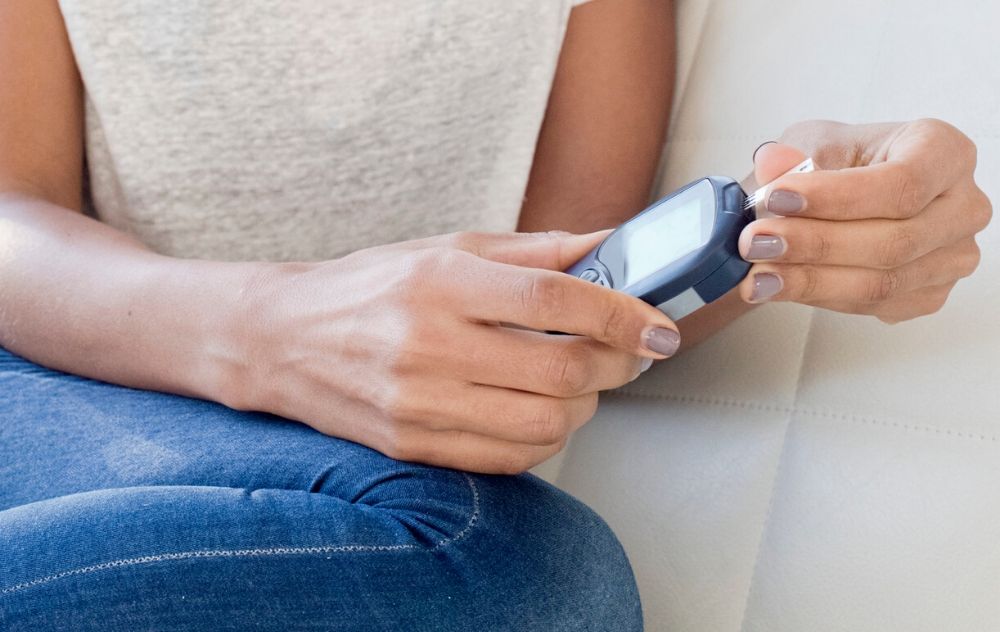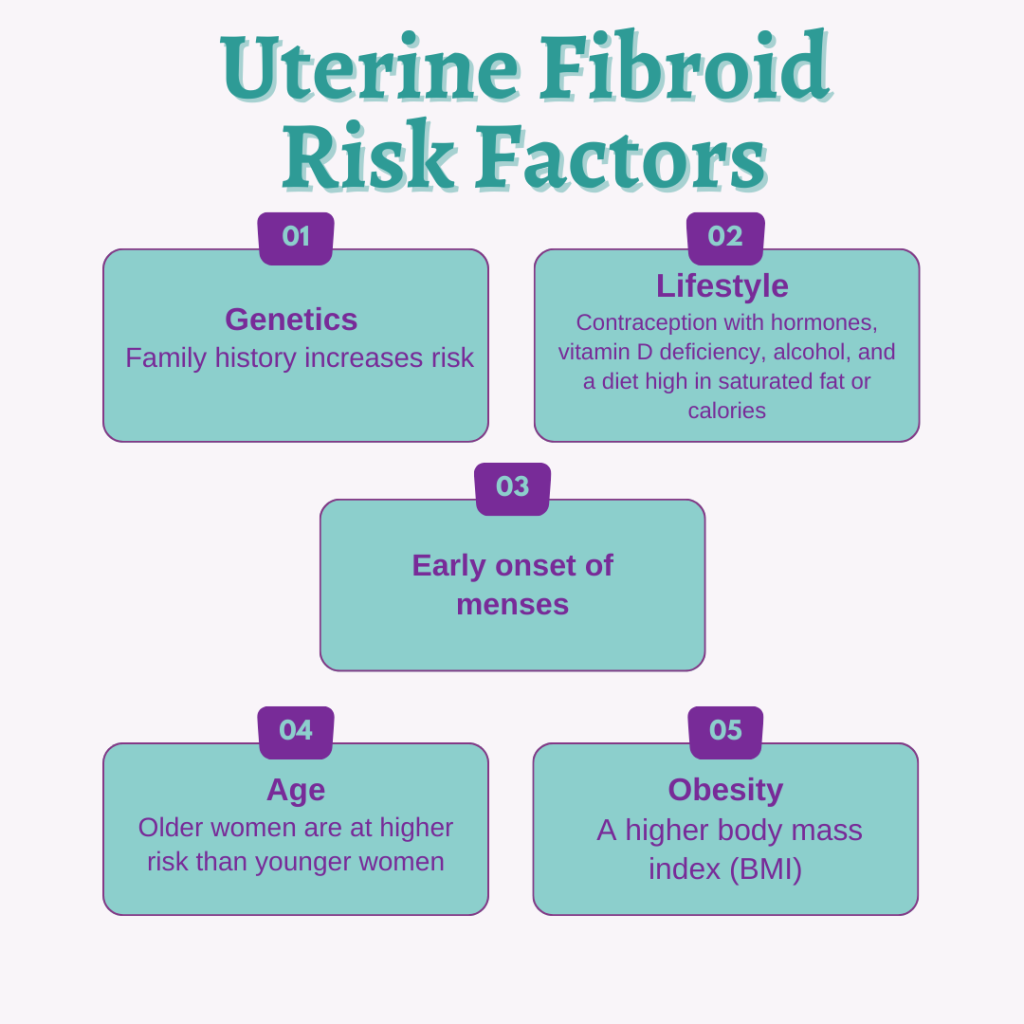
- Diabetes is a chronic health condition that affects how the body processes sugar. When blood sugar levels are too high, it can damage the nerves and blood vessels throughout the body, including the reproductive system. This can lead to a variety of menstrual problems, such as irregular periods, heavy bleeding, and amenorrhea (absence of menstruation).
- Irregular periods are defined as any menstrual cycle that is longer or shorter than 28 days or varies in length from month to month. Irregular periods can be caused by stress, weight changes, and certain medical conditions, such as diabetes, polycystic ovary syndrome (PCOS), and thyroid problems.
- Fibroids are common noncancerous growths that develop in the uterus. They affect up to 80% of women by age 50. Fibroids can range in size from small, undetectable growths to large tumors that can cause a variety of symptoms, including heavy bleeding, painful periods, and pelvic pain.
Many of the same risk factors for fibroids are similar to those associated with Type 2 diabetes.

- Hormonal changes: Diabetes can cause changes in hormone levels, which can affect the menstrual cycle. For example, high blood sugar levels can increase the production of androgens (male hormones), leading to irregular periods and fibroids.
- Insulin resistance: Insulin is a hormone that helps the body use glucose for energy. Insulin resistance is when the body’s cells become less sensitive to insulin. Insulin resistance is common in women with diabetes and PCOS. It is also associated with an increased risk of fibroids.
- Inflammation: Inflammation is a natural response to injury or infection. However, chronic inflammation can contribute to a variety of health problems, including diabetes, heart disease, and cancer. Chronic inflammation is also thought to play a role in developing fibroids.
Could Diabetes Be Affecting Your Period?
Diabetes may affect your menstrual cycle and overall uterine health. During menstruation, the fluctuation of various hormones often causes a rise in blood-sugar levels. This can lead to hyperglycemia if not managed and monitored properly. Hyperglycemia is very serious as it can cause damage to the blood vessels when left untreated.
Changes in your hormone levels before and during your period can often make blood sugar levels difficult to predict. You may also have longer or heavier periods, and food cravings can make managing diabetes harder. You should track this pattern to notice any changes over time.
Fibroid Symptoms
Because fibroid symptoms can be similar to those of other female health conditions, we recommend discussing your symptoms with your doctor. If you are diagnosed with uterine fibroids, it may be good to visit a fibroid specialist and learn about your full range of treatment options.
Diabetes and The Menstrual Cycle: When to Worry
If you have been diagnosed with diabetes, it really just means that you should monitor your blood sugar levels more closely. This is to ensure you’re getting the proper amount of insulin and that you are not at risk of becoming hyperglycemic. For women that are not diabetic, their blood-glucose levels can also fluctuate, but since their pancreas is relatively healthy, they are able to produce insulin to control blood sugar naturally and involuntarily.

Many women, diabetic or non-diabetic, can experience intense cravings during their period. For most women the only concern is waking up with a few extra zits in the morning as a result of the excess sugar consumed the day before. But if you have type 1 or 2 diabetes, its important that you indulge in cravings in moderation to prevent dramatic spikes in blood-sugar levels.
Constant observation of blood-glucose levels will increase your awareness of how your body reacts to the hormones that menstruation and ovulation cause, while also putting you one step ahead those uncomfortable side effects of hyperglycemia.
Why Listening to Your Body Is Key
Diabetes could potentially mask underlying conditions like uterine fibroids, adenomyosis, PCOS, or endometriosis. Diabetes can lead to heavier or longer periods, urinary urgency, period irregularity, or fatigue. These are also symptoms commonly associated with uterine fibroids. It’s important to write down your symptoms, so you can discuss them with your doctor. They will be able to determine if additional tests like an ultrasound or pelvic examination are necessary.
Should You Be Screened for Fibroids?
You may experience some symptoms of uterine fibroids that prompt you to talk to your doctor. Some of the symptoms of fibroids include:
- Heavy bleeding
- Prolonged periods
- Irregular periods
- Severe cramping
If you you are also at risk or have been diagnosed with diabetes, an accurate diagnosis is important.
At our fibroid centers, we exclusively offer a non-surgical, outpatient treatment known as Uterine Fibroid Embolization (UFE) to treat uterine fibroid symptoms. UFE utilizes a minimally-invasive technique to interrupt the blood flow to the fibroids, which will cause the fibroids to shrink. Once the fibroid does not get the oxygen and nutrients it needs to survive, it will naturally die off. This often leads to diminished symptoms.
Fibroid Treatment
With more than 40 treatment facilities across the nation, we are currently the largest network of fibroid centers in the United States. Our leading Interventional Radiologists utilize the most advanced technology to treat uterine fibroids. If you are experiencing heavy, irregular periods, urinary urgency, fatigue from anemia, pelvic pain or cramping, call us at 855.615.2555 to find out how we can help begin your recovery.
Don’t feel like calling? You can also schedule an appointment with us online by clicking the button below.



